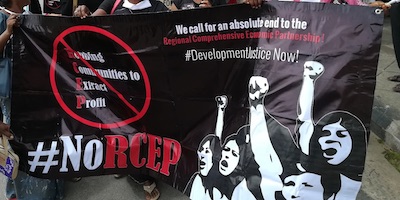16-Dec-2016
Friends of the Earth International
RCEP also includes the controversial Investor-State Dispute Settlement mechanism (ISDS), which is facing increasing public criticism and scrutiny worldwide.
12-Jan-2017
Third World Resurgence
In highlighting that the drafts of many of its key chapters are substantially similar to those of the TPP, Sanya Reid Smith warns that the RCEP may end up as a replica of the former.
2-Mar-2017
People’s Coalition on Food Sovereignty
RCEP will be harmful to developing countries’ struggle for industrialization, access to cheaper medicines, quality social services, and protection of the environment
7-Mar-2017
People Over Profit
People Over Profit Statement on the 17th Round of Negotiations of the Regional Comprehensive Economic Partnership (RCEP) in Kobe, Japan 27 Feb-3 March 2017
19-Apr-2017
Economic Times
Free trade agreements tend to treat intellectual property as an investment made by investor corporations, allowing private investment disputes to be raised against the host country.
27-Apr-2017
Forum against FTAs
Trade unions, farmers groups, health activists, and other people’s movements are planning to organise a series of events to put pressure on the Government of India to withdraw from RCEP negotiations.
5-May-2017
People Over Profit
The People Over Profit network together with local civil society organizations in the Philippines warn of intensifying corporate attacks on people’s rights and join calls for an independent, sovereign and peaceful Southeast Asian region.
17-May-2017
Electronic Frontier Foundation
There has also been no official release of the chapters and textual proposals related to rules that are being tabled.
1-Jun-2017
Focus on the Global South
In the recent “RCEP 18th Round of Talks,” members of civil society organizations and social movements presented their positions vis-à-vis the RCEP.
























